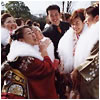Learn About Japan > Japan Through the Year > Public Holidays > Respect-for-the-Aged Day (Third Monday in September)

|

Public Holidays
- New Year's Day or Shōgatsu (January 1)
- Coming-of-Age Day (second Monday in January)
- National Foundation Day or Kigensetsu (February 11)
- Spring Equinox Day or Vernal Equinox (March)
- Golden Week (Late April-Early May)
- Marine Day (Third Monday in July)
- Respect-for-the-Aged Day (Third Monday in September)
- Autumnal Equinox Day (September)
- Culture Day (November 3)
- Labor Thanksgiving Day (November 23)
- Emperor’s Birthday (December 23)
|

To celebrate the Respect-for-the-Aged day, this elementary inivted older members of the community to visit.
Photo Courtesy Hawai-Nishi Shogakko.
Respect-for-the-Aged Day (Third Monday in September)
Respect-for-the-Aged Day was established in 1966 to commemorate the enactment of the Elderly Welfare Law. This holiday was originally celebrated on September 15th, but it was changed to the third Monday of September in 2003. This is the day to pay respect to the elderly for their lifelong contributions to society, and to give well wishes for their longevity.
On Respect-for-the-Aged Day, family members give gifts to their grandmothers and grandfathers to show their gratitude and appreciation. Some local governments send gifts to local seniors and holding special events for them. Traditionally, Japanese start celebrating longevity upon reaching their sixtieth year. Recently, however, more and more people are of the opinion that sixty is too young to be considered elderly.
|
|
|
| Download Podcast in
English
| Japanese
|
|
Document |
Audio-Video |
Chart |
Picture |
Map
|
|

